- ACP International Fellowship Exchange Program
- Internal Medicine: Global Perspectives
- Update Your Knowledge with MKSAP 16 Q & A
- ACP Leaders on the Road: Australia
- ACP Leaders on the Road: Thailand
- International Meetings Update
- ACP Welcomes New International Fellows
- Future Worldwide Internal Medicine Meetings
- Highlights from ACP Internist and ACP Hospitalist
- College Corner
- Email Page to a Colleague
ACP International Fellowship Exchange Program
Application Deadline: August 1, 2013
ACP is pleased to announce that applications for the IFEP are still being accepted! Up to three (one-month) observerships at an institution in the US or Canada, will be awarded to early-mid career internists from countries outside the US and Canada, with an interest in Women's Health. Potential areas of study within Women's Health include HIV/AIDS, breast cancer, cervical cancer, osteoporosis, cardiovascular disease, medical problems related to pregnancy, and depression. Faculty mentors will engage fellows in individual and group clinical and educational experiences and discussions, and facilitate the design of an independent project to be implemented in each fellow's own country upon his or her return.
Up to $6,000 in funding will be provided for travel and expenses for one month, as well as expenses related to attendance at the following ACP Internal Medicine Meeting. For full details, please visit www.acponline.org/IFEP or contact Emily Hartsough at ehartsough@acponline.org for any questions on the program or application process. The deadline for applications is August 1, 2013.
Internal Medicine: Global Perspectives
Khalid A. Qushmaq, MD, MHA, FACP
Governor, ACP Saudi Arabia Chapter
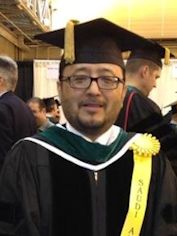 Saudi Arabia is the largest Arab state in Western Asia by land area and the second-largest in the Arab world. Ninety-five percent of the land in Saudi Arabia is desert. Its population is estimated to consist of 16 million citizens, and an additional 9 million registered foreign expatriates and 2 million illegal immigrants. Saudi Arabia is among one of the world's wealthiest nations due to its vast oil reserves. Oil accounts for more than 95% of exports and 70% of government revenue, although the share of the non-oil economy has been growing recently. The Saudi Arabian government has been a monarchy since 1932. Saudi Arabia is the birthplace of Islam and the kingdom is sometimes called "the Land of the Two Holy Mosques" in reference to Al-Masjid al-Haram (in Mecca), and Al-Masjid al-Nabawi (in Medina).
Saudi Arabia is the largest Arab state in Western Asia by land area and the second-largest in the Arab world. Ninety-five percent of the land in Saudi Arabia is desert. Its population is estimated to consist of 16 million citizens, and an additional 9 million registered foreign expatriates and 2 million illegal immigrants. Saudi Arabia is among one of the world's wealthiest nations due to its vast oil reserves. Oil accounts for more than 95% of exports and 70% of government revenue, although the share of the non-oil economy has been growing recently. The Saudi Arabian government has been a monarchy since 1932. Saudi Arabia is the birthplace of Islam and the kingdom is sometimes called "the Land of the Two Holy Mosques" in reference to Al-Masjid al-Haram (in Mecca), and Al-Masjid al-Nabawi (in Medina).
*source: Wikipedia
On Being a Doctor
What is your current position (briefly describe)? What area of medicine-clinical practice, education, research, or administration-takes up most of your time?
I am an assistant professor in the school of medicine at King Saud University for Health Sciences in Riyadh, Saudi Arabia, and a consultant rheumatologist in King Fahad Medical City. I am also the head of the Saudi Rheumatology Fellowship program, one of the largest national fellowship programs in Saudi Arabia. We have more than 15 fellows who have completed their internal medicine residency program and are participating in this two-year program.
In my clinical practice, I treat patients, both in and out of the hospital setting, who have rheumatologic and autoimmune diseases. I also conduct research in the areas of rheumatoid arthritis and lupus, and I teach rheumatology clinical skills to medical students.
Who or what inspired you to go to medical school and what do you enjoy most about being a doctor?
I find medicine to be a science of humanity and wisdom, where you can change people's lives by facilitating healing or discovering cures. The feeling of your patients' satisfaction and cure is a great feeling that can't be procured by money or fame.
You did your medical residency at the University of British Columbia, Vancouver, Canada and received your Master of Health Administration degree from Washington University of Saint Louis, Missouri-what did you enjoy or find challenging about each of these experiences?
My experience as a medical resident at the University of British Columbia was great. I consider it a golden time in my professional life. It was challenging and competitive, but it gave me the chance to build my skills, competency, and confidence.
Studying health administration at the Washington University of St. Louis, Missouri, helped shape my administrative and heath care leadership skills. My goal is to be a leader in health care management who improves patient care.
Internal Medicine in Saudi Arabia
What is the role of internists in Saudi Arabia (e.g. primary care, specialist, consultant)? What are the education, training, and certification requirements needed to practice internal medicine?
Internists in Saudi Arabia work as specialists or consultants in a hospital setting. They complete a minimum of four years training, either in a national program or abroad, usually in the United States, Canada, or Europe. Most internists do a subspecialty, and practice in both fields.
The internist usually deals with internal medicine cases referred to him by primary care or admitted through the emergency room, and then follows up in his outpatient clinic.
What illnesses and problems do internists in Saudi Arabia treat most often? Are there any trends in chronic illness or disease that you are particularly concerned about?
Internists in Saudi Arabia deal with many of the same chronic illnesses that are common throughout the world, like diabetes, hypertension, and ischemic heart disease. An internist also treats patients with thrombosis and infectious diseases, like TB.
Do internists work most often in private offices or in hospital settings? To what extent do physicians and hospitals use electronic health records?
Internists typically work in hospitals and conduct their clinics in these hospitals while others work in private hospitals. The use of EHR varies from hospital to hospital, but in the majority of hospitals a basic EHR is being used. More advanced systems are used in the tertiary care hospitals.
Does everyone in Saudi Arabia have access to health care? If not, what are the obstacles?
Saudi nationals have free access to health care services in the governmental hospitals and primary care centers. Expatriots buy medical insurance or receive it from their employers, and the services are provided by private hospitals.
Are there enough young physicians in Saudi Arabia choosing to be internists? What makes them choose (or not choose) to practice internal medicine?
Most young graduates of internal medicine programs like to do a subspecialty fellowship. A small number practice general medicine and have extra training in thrombosis or geriatric care. Currently, there is a shortage of internists in most hospitals.
Is access to the internet influencing what patients want from their doctors in Saudi Arabia?
A good number of patients in Saudi Arabia are more educated about their diseases now and they challenge their physicians with the information they get from the internet. Usually, they are looking for the latest advances in diagnosis and management of their diseases.
What are some of the most significant challenges that physicians in your country face? What are your thoughts on the best way to meet those challenges?
Some of the challenges we face are the competitive, attractive work markets in the gulf region which attract the outstanding physicians from Saudi Arabia; even some of the universities in the United States were able to attract a good number of their Saudi graduates to teach in their universities.
The best way to retain our physicians and meet these challenges is to improve the pay of Saudi physicians.
What can other countries learn from your health system?
Other countries could learn from our health care system that it's important to invest in manpower. Our government has made all resources available to our medical school graduates and encourages them to continue their postgraduate studies in the United States and Canada; as a result, the health care system now has a good number of consultants in most specialties.
ACP
What do you find to be the most challenging part of your role as the Governor, ACP Saudi Arabia Chapter? What have you found to be the most rewarding??
As a governor, the most challenging part of my role is to establish the chapter from scratch and make it excellent.
The most rewarding part is to see the enthusiasm in the eyes of our young Saudi physicians who are proud to be part of ACP and want to compete with their international peers.
Why is it important for physicians to belong to a professional organization like ACP?
It is important because professional organizations like ACP help physicians maintain a high degree of professionalism in their attitude and practice. They also provide knowledge and valuable skills and keep them updated in their field.
Update Your Knowledge with MKSAP 16 Q & A
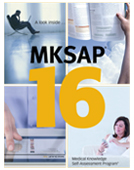
The new Medical Knowledge Self-Assessment Program® (MKSAP® 16) provides you with the most current and critical information in the core of internal medicine and its subspecialties so you can stay aware of what you need to know as a practicing physician in internal medicine today.
For more information on MKSAP 16, or to order your copy, visit http://www.acponline.org/products_services/mksap/16/
MKSAP 16 Q & A
A 70-year-old man is evaluated for sharp left-sided pleuritic chest pain and shortness of breath that began suddenly 24 hours ago. The pain has been persistent over the past 24 hours and does not worsen or improve with exertion or position. History is significant for severe COPD, hypertension, and hyperlipidemia. He is a current smoker with a 52-pack-year history of smoking. Medications are ipratropium, albuterol, lisinopril, simvastatin, and aspirin.
On physical examination, temperature is normal, blood pressure is 128/80 mm Hg, pulse rate is 88/min, and respiration rate is 18/min. BMI is 24. Oxygen saturation on ambient air is 89%. Cardiac examination reveals distant heart sounds but no S3. Lung examination reveals hyperresonance, decreased chest wall expansion, and decreased breath sounds on the left. The trachea is midline.
Which of the following is the most appropriate diagnostic test to perform next?
A. Chest CT
B. Chest radiography
C. Echocardiography
D. Electrocardiography
Click here for the answer and critique.
ACP Leaders on the Road: Australia
Phyllis A. Guze, MD, MACP, Immediate Past Chair, ACP Board of Regents
Royal Australasian College of Physicians Meeting - May 26-29, 2013
In May I had the opportunity to attend the 2013 Congress of the Royal Australasian College of Physicians (RACP). Held in the convention center in Perth, Australia, the location provided an opportunity to enjoy the city as well as going to scientific sessions. Perth is experiencing an economic boom due to the development of the mining industry. Because of the influx of miners and those associated with the industry, there has also developed a booming service industry and excellent restaurants. There is a vibrancy and excitement that is tangible as one walks the streets and encounters the local population.
This Congress coincided with the 75th anniversary of the founding of the RACP. On the first evening, the convocation for the new fellows was held, providing us all with the chance to celebrate with talented young physicians who are the future of our great profession. It was heartwarming to see the diversity of the young physicians who became Fellows during this convocation.
The opening session the next day was prefaced by a tribute to the traditional aboriginal landowners, followed by a talk by an aboriginal professor about providing health care for the indigenous population. The three days of scientific sessions were organized along "educational tracks" - Physicians as Advocates, Physicians as Clinical Leaders, Physicians as Educators, Physicians of the Future, Physicians as Medical Experts, Physician's Performance and Professionalism, Physicians in Research and Physicians in the Workplace. Participants were able to follow one or a number of tracks across the three day meeting.
I was fortunate to meet with the presidents of 7 international Colleges and Academies of Physicians (and Surgeons) at a breakfast where we were asked to present a five minute discussion regarding the three most pressing issues related to medical education in our respective countries. One of the most interesting issues that surfaced was the movement of a number of countries from the British system to the American system of accreditation and certification.
The always welcome social occasions included a reception for the new fellows, a dinner for the international leaders and a dinner for the whole congress. The international leaders also had a day-long Urban Indigenous Tour that included exploration in a wild animal park and lunch with an aboriginal elder who spent time discussing his culture. This latter event not only provided a brief respite from our busy lives but a chance to network with international colleagues.
The RACP Congress 2013 was a most enjoyable as well as instructive experience. My special thanks to Associate Professor and President, Leslie Bolitho and the outstanding RACP staff.
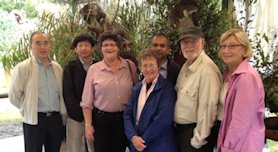
Dr. Guze at the Wild Animal Park outside Perth with international leaders from Singapore, Sri Lanka, Australia and New Zealand
ACP Leaders on the Road: Thailand
David L. Bronson, MD, MACP, ACP Immediate Past President
Royal College of Physicians of Thailand Meeting - April 24-27, 2013
I had the privilege of attending the 29th Annual Royal College of Physicians of Thailand meeting in Pattaya, Thailand on April 24 to April 27. The meeting was held in a beach town at an extensive complex that included a convention center. There were 2,000 attendees out of the 5,000 total members of the College. All were internists and internal medicine subspecialists. As a visiting international dignitary, I was treated exceptionally well. Also attending were Sir Richard Thompson, president of the Royal College of Physicians of London, and regional dignitaries from several nations. The keynote address was given by Dr. Irving Weissman of Stanford University. It was outstanding.
I and the international delegation of about seven Association/College presidents or leaders were honored with Honorary Fellowship in the RCPT.
There was a lot of work done in bringing new resident graduates into the college structure. At the convocation ceremony, all new graduates are recognized as new members of the Royal College. They will have to pass their examination to have that official, but that is pretty much anticipated to happen. Like in so many other countries, the Royal College leads in postgraduate education, but also prepares the board examinations and certification. There was a fellowship ceremony as well. One unique innovation is their emphasis on subspecialty training in bringing the subspecialties into the College actively. With that in mind, new fellows are introduced by their specialty and by the head of the local subspecialty chapters.
I attended the Association of Southeast Asian Nations (ASEAN) Forum. It was done in response to official and endorsed ASEAN goals to develop the free flow of professionals in a variety of areas, including medicine across the ASEAN countries. It is a goal with many barriers, and this panel discussion was part of part of the process of defining those differences and gaining a greater understanding. It will be a daunting task to have a single licensure across the systems in countries given the diversity of training, certification sophistication, teaching, and medical practice.
It was a panel discussion of the leaders of the RCPT and the presidents of the appropriate college or internal medicine organization for each participating country. At the meeting were the presidents or Masters of the appropriate medical organizations of Thailand, Laos, Singapore, Myanmar, Hong Kong, and the Philippines. Five of the six countries represent the foundation of the new ACP Southeast Asia chapter.
Overall, it was a very productive meeting and I enjoyed attending very much.
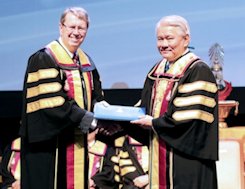
Dr. Bronson receives Honorary Fellowship from the RCPT President, Dr. Kriang Tungsanga.
International Meetings Update
Polish Society of Internal Medicine 6th Ethics Symposium and 12th National Educational Conference
April 4-6, 2013
The Polish Society of Internal Medicine held its sixth Ethics Symposium "Ethical Dilemmas in Medical Practice - Should Physicians Provide Spiritual Care for their Patients" on April 4, 2013, which was attended by approximtely 200 individuals. A majority of the group was physicians, but also in attendance were chaplains, clergy, and one bishop. Christina M. Puchalski, MD, FACP, served as the ACP International Ambassador to the meeting. Dr. Puchalski also provided the keynote address at the annual conference "Advances in Internal Medicine" that immediately followed on Friday. The conference drew approximately 3,000 total attendees.
43rd Philippine College of Physicians Annual Convention/1st ASEAN Federation of Internal Medicine (AFIM) Congress
May 5-8, 2013
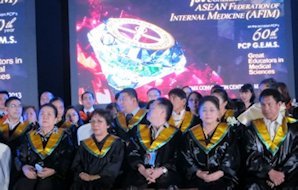 The Philippine College of Physicians held its 43rd Annual Convention, titled "PCP GEMS: Great Educators in Medical Sicences" from May 5-8, 2013, in Manila, Philippines. The convention was held in conjunction with the first annual congress of the ASEAN (Association of Southeast Asian Nations) Federation of Internal Medicine (AFIM). The estimated attendance at the meeting was around 7,500 individuals.
The Philippine College of Physicians held its 43rd Annual Convention, titled "PCP GEMS: Great Educators in Medical Sicences" from May 5-8, 2013, in Manila, Philippines. The convention was held in conjunction with the first annual congress of the ASEAN (Association of Southeast Asian Nations) Federation of Internal Medicine (AFIM). The estimated attendance at the meeting was around 7,500 individuals.
A number of dignitaries from other ASEAN internal medicine societies attended the meeting, including Dr. Alan Ng, President, College of Physicians of Singapore, Dr. Kriang Tungsanga, President, Royal College of Physicians of Thailand, and Dr. Idrus Alwi, President, Indonesian Society of Internal Medicine
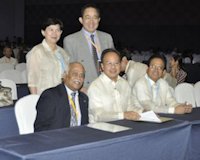
Dr. Kutty with PCP leaders
Kesavan Kutty, MD, MACP, served as the ACP International Ambassador to this meeting. He gave two talks, "Sleep Disorders in Shift Workers" and "Heavy Breathing: Ventilatory Issues in Obesity." There was also an ACP exhibit booth at this meeting.
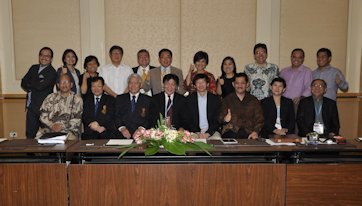
AFIM leaders
ACP Chile Chapter Meeting
May 9-10, 2013
The ACP Chile Chapter held its annual meeting May 9-10, 2013 in Santiago Chile. Approximately 150-200 attendees assisted the meeting, including students, residents/fellows, members, and APC Fellows. Many were from Santiago, but some also came from considerable idstances within Chile.
R. B. Slease, MD, FACP, attended the meeting as the ACP International Ambassador. Dr. Slease spoke on "Moving Towards Personalized Care in Multiple Myeloma" and "Use and Misue of Hematopoietic Growth Factors".

From left: Dr. Guillermo Conte, Governor, ACP Chile Chapter; Dr. Guillermo Acuna, Governor Emeritus, ACP Chile Chapter; Dr. Maria Pinto, Immediate Past Governor, ACP Chile Chapter; Dr. Brad Slease, ACP International Ambassador; Dr. Jose A. Rodriguez-Portales, Past Regent, ACP; Dr. Juan Carlos Bagattini, Uruguay.
Annual Meeting of the Society of Internal Medicine of Uruguay
May 13-14, 2013
The 4th Update in Internal Medicine meeting was held by the Society of Internal Medicine of Uruguay from May 13-14, 2013 in Montevideo, Uruguay. There were approximately 100 attendees at the meeting, most of whom were internists, subspecialists, residents, and some students. While many attended from local institutions, there were also guests from Chile, Argentina, and the United States.

From left: Dr. Bagattini and Dr. Slease
R. B. Slease, MD, FACP, was invited to attend the meeting as the ACP International Ambassador by Juan Carlos Bagattini, MD, FACP, Program Chair of the Uruguay Society of Internal Medicine. Dr. Slease spoke on "Moving Towards Personalized Care in Multiple Myeloma" and "Use and Misue of Hematopoietic Growth Factors".
New International Fellows
ACP is pleased to announce the following newly elected International Fellows, who were recommended by the Credentials Committee and approved for election by the Board of Regents as of July 1, 2013. They are listed by current location and may have been credentialed through a different Chapter.
Australia
-
Leslie E. Bolitho, MBBS, FACP - Sydney, NSW
-
Anoop K. Enjeti, MD, MBBS, FACP - Waratah, NSW
Bangladesh
-
Jahanara Arzu, MD, FACP - Gulshan, Dhaka
Brazil
-
Fabio Nasri, MD, FACP - Sao Paolo
- Francisco L. G. M. Magalhaez, MD, FACP - Curitiba
-
Marcelo G. Cliquet, MD, PhD, FACP - Sorocaba
Canada
-
Meteb M. Al Bugami, MBBS, FACP - Halifax
- Alfonso Iorio, MD, PhD, FACP - Hamilton
- Alexander A. Leung, MD, FACP - Calgary
- Richard B. Kim, MD, FACP - London
- Bayan Missaghi, MD, FACP - Calgary
- Sankar N. Prakash, MBBS, FACP - Windsor
- Ranganayaky Shivakumar, MBBS, FACP - Sudbury
- Olga Tourin, MD, FACP - Calgary
- Michael E. Weingert, MD, FACP - London
-
Rabeh M. El Zuway, MBBCh, FACP - St. Catherine
Chile
-
Juan Carlos Rodriguez Tapia, MD, FACP - Santiago
Colombia
-
Abelardo Montenegro Cantillo, MD, FACP - ManizalesC
- Adolfo Vera-Delgado, MD, FACP - Cali Valle
- Heli Hernandez Ayazo, MD, FACP - Cartagena Bolivar
-
Manuel Pacheco Gallego, MD, FACP - Pereira Risaralda
England
-
Mustafa Feroze, MD, FACP - Heckington Lincolnshire
-
Anoja C. Rajapakse, MD, FACP - Newark
Germany
-
Daniel C. Baumgart, MD, FACP - Berlin
India
-
Bhupendra Chaudhary, MD, FACP - Meerut
- M. Chenniappan, MBBS DM, FACP - Trichy
- Arpit Jain, MD - Gurgaon
- Ravi R. Kasliwal, MBBS MD, FACP - Gurgaon
- Navin Kumar Soni, MD, FACP - Ghaziabad
- K. G. Madhu, MD, FACP - Kerala
- Badurudeen B. Mahmood, MBBS, FACP - Chennai, Tamil Nadu
- V. Mohan, MD, FACP - Chennai
- Isaac Christian Moses, MD, FACP - Coimbatore
- Kumar Natarajan, MD, FACP - Coimbatore
- G. Sengottuvelu, MD, FACP - Chennai
- Ashutosh Shukla, MD, FACP - New Delhi
- Samia Rashid, MD, MBBS, FACP - Srinagar
-
Vijay Viswanathan, MD, FACP - Chennai
Indonesia
-
Idrus Alwi, MD, FACP - Jakarta
Japan
-
Kengo Tomita, MD, FACP - Saitama
- Makito Yaegashi, MD, FACP - Kamogawa, Chiba
-
Minako Yamaoka-Tojo, MD, FACP - Sagamihara Kanagawa
Jamaica
-
Adedamola K. Soyibo, MD, FACP - Kingston
Jordan
-
Nabill A. Akash, MBBS, FACP - Amman
Malaysia
-
Tee Teong Jin, MD, FACP - Kuala Lumpur
Mexico
-
Eduardo Meneses Sierra, MD, FACP - Saltillo, Coahuila
Myanmar
-
Aung Cho Myint, MBBS, FACP - Kamayut, Yangon
Netherlands
-
Frank H. Bosch, MD, FACP - AD Arnhem
Nigeria
-
Adebayo T. Oyedeji, MBChB, FACP - Osogbo
-
Fatai K. Salawu, MBBS, FACP - Yola, Adamawa
Norway
-
Hanne L. Thurmer, MD,PhD, FACP - Notodden
Pakistan
-
Sajjad Ali, MBBS, FACP - Karachi
Panama
-
Ricardo A Lyma-Young, MD - Panama
-
Victor J. Warner, MD, FACP - Veraguas
Philippines
- Nenita A. Collantes, MD, FACP - Quezon City
- Brenda M. Espinosa, MD, FACP - San Fernando La Union
- Kenneth Y. Hartigan-Go, MD, FACP - Quezon NCR
- Anthony C. Leachon, MD, FACP - Commonwealth QC
- Norbert Lingling D Uy, MD, FACP - Quezon City
-
Ofelia M. Samar-Sy, MD, FACp - Legazpi City Bicol
Saudi Arabia
-
Mogbil A. Al-Hedaithy, MD, FACP - Riyadh
- Khaled A. Alswat, MBBS, FACP - Taif
- Mohammed A. Basheikh, MBBS, FACP - Jeddah
- Abdul Rahman Agha D. El Kinge, MD, FACP - Riyadh
- Fayaz A. Handoo, MBBS, MD, FACP - Riyadh
- Hussein A. Younes, MBBS, FACP - Jeddah
-
Mohammad A. Matin, MBBS, FACP - Riyadh
Singapore
-
Hwee Yong Lim, MBBch, FACP - Singapore
Sri Lanka
-
Priyankara Jayawardana, MD, FACP - Colombo Western
-
Kanapathipillai Thirumavalavan, MD, FACP - Colombo
Switzerland
-
Jan von Overbeck, MD, FACP - Zurich
Thailand
-
Chitr Sitthi-Amorn, MD, FACP - Bangkok
United Arab Emirates
-
Ali Abdul Kareem Alobaidli, MD, FACP - Abu Dhabi
- Umar A. Beejay, MBBCh, FACP - Abu Dhabi
- Salem Arifi Beshyah, MBBCh, FACP - Abu Dhabi
- Samir S. Kadada, MD, FACP - Northborough
-
Haytham Ali Taha, MBBS, FACP - Abu Dhabi
Venezuela
-
Jose Antonio Parejo Adrian, MD, FACP - Caracas
- Roberto J. Ochoa, FACP - Caracas
-
Virginia A. Salazar Matos, MD, FACP - Caracas
Future Worldwide Internal Medicine Meetings
Upcoming meetings will be held in Brazil and Paraguay.
A complete list of other Future Worldwide Internal Medicine Meetings is available here.
Highlights from ACP Internist and
ACP Hospitalist
ACP Internist May/June 2013
- Early interventions overlooked in OA
Osteoarthritis has been somewhat neglected, according to a recently formed consortium that is advocating for more proactive diagnosis and intervention.
- Reflections from a physician who faced his mortality
A physician who developed severe heartburn recalls his thinking as he reflects on his own progressively severe symptoms and increasingly worrisome differential diagnosis.
- How to start and stop bisphosphonates
A new online tool and a few simple rules can inform internists how to start bisphosphonates and when to consider taking a drug holiday at the request of another physician, a dentist or even the patient.
- 'Party drugs' require hard work to spot and treat
Taking a history is important for identifying abuse of some drugs that aren't caught by screening tests but may still have serious consequences for users.
- Contraception review offers solutions to a perennial problem
Half of all pregnancies in the U.S. are unintended, a figure on par with developing countries. Women often think they are not at risk of getting pregnant when they most certainly are.
ACP Hospitalist June 2013
- Stopping delirium before it starts
Large-scale efforts to prevent delirium have been around for years, but hospitals also can take smaller measures if they don't have the immediate resources or ability to overhaul care.
- HIV in the hospital
All doctors should be screening patients age 13 through 64 for HIV.
- Diagnosing lung infection in HIV
The majority of lung infections are caused by one of three organisms.
- Nailing down the nephrotic syndrome
Blood and urine composition provide key clues.
College Corner
Register Now for ACP Internal Medicine 2014
Internal Medicine 2014 will be held April 10-12, 2014 in Orlando, Florida. For more information, please visit: http://im2014.acponline.org/.
Renew Your ACP Membership for 2013-14
ACP's membership year runs from July 1 to June 30 each year. Renew your membership today to ensure the continuation of your ACP benefits.
Join ACP's Special Interest Groups!
This newly expanded forum provides ACP members with a place to engage in discussions, share ideas, and support one another professionally and personally. Participate by joining as many groups as you'd like, then connect with ACP members from all over the world with similar interests. Groups include Working Abroad, Women in Medicine, Emerging Technology, Clinical Problem-Solving, and many more. Join today!
MKSAP 16 Answer & Critique
Answer: B, Chest radiography
Educational Objective: Evaluate a patient with pleuritic chest pain.
Critique: This patient should undergo radiography of the chest. He has severe COPD and findings consistent with spontaneous secondary pneumothorax. These findings include sudden, sharp, nonradiating pleuritic chest pain and shortness of breath with hyperresonance, decreased breath sounds, and decreased chest wall expansion on the side of the pneumothorax in a patient with underlying lung disease. Pneumothorax should be considered in any patient with sudden onset of pleuritic chest pain and dyspnea. The diagnostic test of choice if pneumothorax is suspected is an upright chest radiograph. Findings on chest radiograph include separation of the parietal and visceral pleura by a collection of gas and the absence of vessels in this space. The diagnosis of pneumothorax may be difficult in patients with COPD because the pleural line may be difficult to visualize in hyperlucent lung tissue, and a pneumothorax may be difficult to distinguish from a large bulla.
Chest CT also can be used to diagnose a pneumothorax. Chest CTs may be more sensitive in delineating smaller collections of gas in the pleural space and in providing more information about the pulmonary parenchyma and pleura. Plain film radiography remains the initial test of choice for most patients, however, and CT of the chest should be reserved for patients in whom the chest radiograph does not provide information to guide further treatment or evaluation.
The patient's history and physical examination are classic for pneumothorax and his pain descriptors do not strongly suggest ischemia or other primary cardiovascular disease. An electrocardiogram or echocardiogram, tests of choice to evaluate ischemic heart disease, valvular heart disease or cardiomyopathy, would not be the first diagnostic test of choice for suspected pneumothorax.
Key Point: Pneumothorax should be considered in any patient with sudden onset of pleuritic chest pain and dyspnea, and the diagnostic test of choice if pneumothorax is suspected is an upright chest radiograph.
Bibliography:
Noppen M. Spontaneous pneumothorax: epidemiology, pathophysiology and cause. Eur Respir Rev. 2010;19(117):217-219. [PMID: 20956196]

